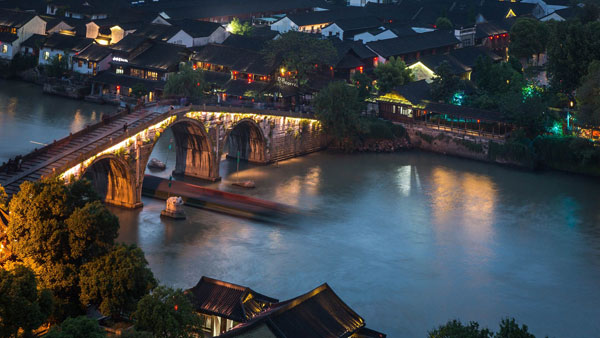China’s lakeside paradise on earth bucks urbanization trends

Hangzhou contains a beautiful landscape, an elegant cultural atmosphere and honest folk heritage. Its success is an exception in the process of China’s urbanization.
The life of Bai Juyi (772-846), a famous Tang poet, was intertwined with the city Hangzhou. He was deeply enchanted by the beauty of this city.
At the age of 70, he wrote three short poems collectively titled Memories of the South to express his love for Hangzhou. Although Bai’s poems-such as The Song of the Pipa Player, Song of Everlasting Sorrow and The Elderly Charcoal Seller-have established Bai’s status in Chinese literary history, the line, “Memories of the South! Most fondly I remember Hangzhou” from Memories of the South cemented it.
The beauty of Hangzhou inspired Bai’s style of writing and in return, Bai testified to the beautiful landscape in this city. He once served as a prefectural governor in Hangzhou and his achievements and hard work left a deep impression on this city. Most of his poems about Hangzhou recorded his concern for local water conservation projects. Under the burning sun, this gentle and cultivated governor wore a black gown and straw sandals, walked along the shores of the West Lake and found pleasure in thinking about the details of constructing a dam.
But Bai is not the only one enthralled by the beauty of Hangzhou. Sitting on the West Lake among mountains and temples, Hangzhou is endowed with endless love from a line of emperors, feudal ministers, ancient scholars and literati, leaving countless legends to the later generation.
Undoubtedly, the process of urbanization in modern China has developed rapidly, and Hangzhou is regarded as a unique example of a Chinese city. Compared to many Western cities which transformed from industrial cities into post-industrial cities, Hangzhou was almost born to be a post-industrial society. It still contains a beautiful landscape, a simple cultural atmosphere and honest folk heritage. Its success is an exception in the process of China’s urbanization.
Today, Hangzhou’s city capital not only shows the unique business value of the accumulated history and culture, but also plays a significant role in nature, society and many other areas.
Every green mountain and river has the potential to transform into industrial capital. Investing in natural capital not only improves the value of water, air and forests and realizes the output of resources but also leads to tertiary forms of output, such as ecotourism and ecological agriculture, realizing the simultaneous increase in GDP.
People who have visited Hangzhou cannot forget its beautiful landscape. Its geography still preserves its natural appearance. In the process of urbanization, Hangzhou didn’t focus on indiscriminate development, but instead made selective choices to strive for tourism, culture, Internet development and improvements to the service industry. It had a targeted plan to protect the rare ecological environment and makes good use of development to transform green mountains and rivers into industrial capital.
Now the government in Hangzhou is dedicated to building Hangzhou into the “capital of wisdom,” the “city of cultural innovation” and the “center of Internet industry” in China, which is an important strategy for further development. With the gradual loss of the advantage of Chinese labor and the progress of economic transition, regional intellectual capital offers an effective approach and experience for China and regional economic development and innovation. Intellectual capital is capable of making great contributions to changes in the economic development model, strengthening the capacity of independent innovation, implementing national and regional economic transformation.
In addition, the government of Hangzhou has put human capital in a central position and has allowed talent to play a core role, which will contribute to the implementation of regional intellectual capital. The beauty of wisdom and the path of innovation are playing a more and more important role in the development of Hangzhou.
